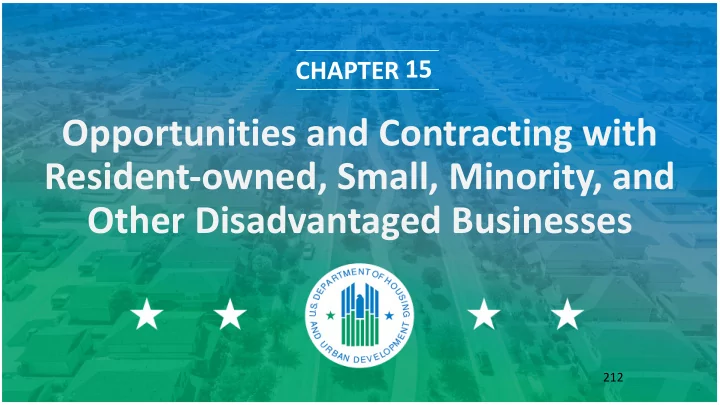

15 CHAPTER Opportunities and Contracting with Resident-owned, Small, Minority, and Other Disadvantaged Businesses 212
Contents • Training and Employment Opportunities • Section 3 of the Housing and Urban Development Act of 1968 • Resident-owned Businesses • Contracting with Resident Management Corporations • Assistance to Small and Other Disadvantaged Businesses • PHA Reporting 213
Introduction • HUD encourages: • Training and employment opportunities to residents and contracting with residents and resident-owned businesses • PHAs to establish goals for contract awards to small and minority- owned businesses and minority business enterprises (MBEs), women’s business enterprises (WBEs), and businesses in labor surplus areas 214
Section 3 • Section 3 objectives must be consistent with existing federal, state, and local laws and regulations • Section 3 ensures HUD financial assistance creates employment, training, and business opportunities for low- and very-low-income persons, particularly those who receive government assistance for housing or residents of the community where federal assistance is spent 215
Section 3: Covered Programs and Covered Work • Applies to PHA funds used for: • Housing development • Operations • Capital fund programs • Expenditure of funds generated by the HCV • Non-federal funds such as Tax Credit • Does not apply to Section 8 landlords, but does apply to the expenditure of Section 8 funds for supplies and services • Applies to contracts for work • Does not apply to contracts for purchase of supplies and materials • Contracting with PHA resident-owned businesses for purchase of supplies and materials is considered providing an “other business- related economic opportunity” under 24 CFR §135.40, which can be used to satisfy a PHA’s overall Section 3 obligations 216
Mandatory Section 3 Contract Clause • Mandatory Section 3 contract clause: 24 CFR §135.38 • Applies to all contracts covered by Section 3 • Covered contracts include: • Developments • Operating • Modernization assistance • Expenditure of funds generated by the HCV • Non-federal funds such as Tax Credit • Does not apply to Section 8 landlords, but does apply to expenditure of Section 8 funds for supplies and services • Section 3 does not apply to contracts for supplies and materials unless purchase includes installation of items 217
Section 3: Annual Report • PHAs must submit to HUD an annual report using Section 3 Data Reporting System on form HUD-60002—Economic Opportunities for Low- and Very Low-Income persons • Access form HUD 60002 through HUD’s Web Access Secure System (WASS) 218
Resident-owned Businesses (ROBs) • HUD encourages PHAs to contract with resident-owned businesses • PHAs are allowed (but not required) to use an alternative procurement process when contracting with resident-owned businesses for public housing services, supplies, or construction 219
Alternative Procurement Process • PHA prepares Independent Cost Estimate (ICE) for procurement and selects appropriate method of procurement • PHA solicits a quote, bid, proposal, or offer from one or more resident-owned businesses • PHA receives offer(s) from one or more resident-owned businesses and ensures that: • Offeror has submitted required certifications described in 24 CFR Part 963.10(d) • Previous contracts received under alternate procurement process must be less than $1,000,000 • Cost or price analysis of the offer(s) received is performed and price is reasonable 220
Contracting with a Resident Management Corporation (RMC) • PHA may enter into a contract with RMC to provide property management under 24 CFR Part 964, Tenant Participation and Tenant Opportunities in Public Housing • Contract between PHA and RMC is administered as any other contract for services and is subject to any collective bargaining agreement provisions • Competitive bid requirements do not apply to PHA decision to contract with RMC for property management 221
Contracting with a Resident Management Corporation (RMC) (cont.) • PHA sole-source awards to RMC must meet certain conditions to differentiate RMC from resident-owned business • Meets all criteria to qualify as RMC • Demonstrate capability to perform proposed work and that price is reasonable. • Fidelity bond coverage and insurance or equal protection to PHA and HUD • Comply with requirements of 2 CFR §200 • Audited each year by a licensed CPA and submit audit report to HUD and PHA within 30 days 222
Assistance to Small and Other Disadvantaged Businesses • PHAs are required to make every feasible effort to ensure small businesses, MBEs, WBEs, and labor surplus area businesses participate in PHA contracting • PHAs should establish goals that measure effectiveness of efforts without limiting competition • PHAs required to report on MBE progress semi-annually using Form HUD-2516 223
Engaging Small and Disadvantaged Businesses • Study existing barriers • Review and modify any PHA policies and procedures • Communicate directly with disadvantaged firms and resident- owned businesses • Maintain a list of disadvantaged and resident-owned firms and notify them of planned procurement activities • Establish partnerships with other community and governmental agencies • Consider partnering in a consortium or interagency agreement with other PHAs or units of local government 224
Recommend
More recommend